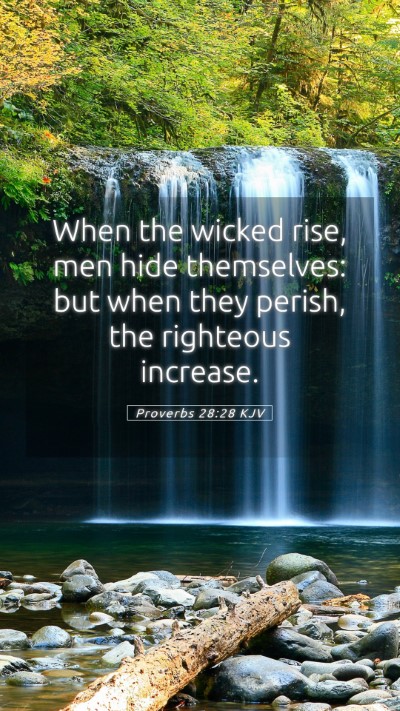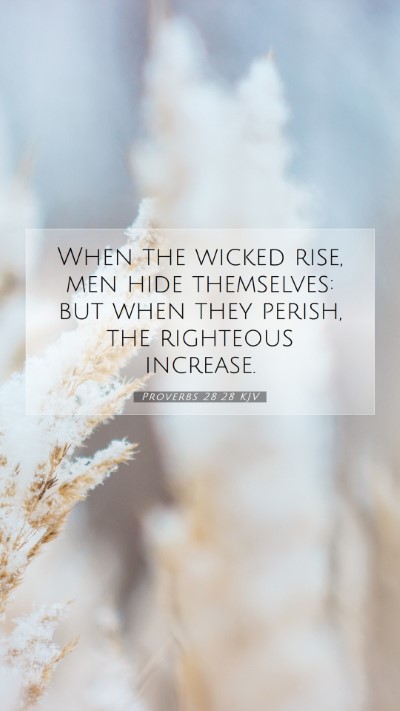Understanding Proverbs 28:28
Proverbs 28:28 states: “When the wicked arise, men hide themselves: but when they perish, the righteous increase.” This verse presents a profound contrast between the fate of the wicked and the righteous, illustrating themes of justice, morality, and societal dynamics.
Bible Verse Meanings
This proverb serves as a poignant reminder of the consequences of wickedness in society. The phrase “when the wicked arise” indicates a time of upheaval and chaos, where the actions of the wicked cause alarm and fear among the populace. Those who live righteously, however, can expect to see their fortunes flourish as the wicked face judgment.
Bible Verse Interpretations
- Matthew Henry: In his commentary, Henry emphasizes that the rising of the wicked brings about fear, driving good people to seek refuge. He suggests that the moral decay instigated by the wicked leads to societal instability.
- Albert Barnes: Barnes points out that the term "hide themselves" reflects a natural response to danger. The wicked’s influence corrupts, whereas their downfall results in the elevation of the righteous. He correlates this with the notion that divine justice ultimately prevails.
- Adam Clarke: Clarke describes the seasonal aspect of the verse, noting how the wheat and tares grow together, but the end will bring separation. He discusses how righteousness becomes more apparent and influential in the absence of wickedness.
Bible Verse Understanding
Understanding this verse requires a recognition of the cycles of human behavior and morality. The emergence of wickedness leads to societal retreat, but once it is eradicated or diminishes, righteousness prevails, suggesting that good triumphs eventually. This serves as an encouragement for the righteous, affirming that their integrity will lead to flourishing even amidst turmoil.
Bible Verse Explanations
The explanation of this verse hinges on the understanding of moral drops in societal leadership and its implications on people's behavior. When wicked leaders or influences arise, those who are righteous tend to protect and distance themselves, which is a reflection of the fear and uncertainty these influences create. Conversely, the demise of such wickedness is marked by a resurgence in virtue and ethical living, which signifies a brighter and flourishing community.
Scripture Analysis
This proverb's analysis leads to several broader themes regarding how society reacts to moral corruption and the eventual outcomes when justice prevails. It highlights the responsiveness of the human condition and moral structures relative to acts of righteousness and wickedness.
Key Takeaways
- The wicked's power is temporary; their actions lead to eventual downfall.
- The righteous will ultimately prevail and thrive in the wake of injustice.
- Societal responses fluctuate between fear and prosperity based on moral conduct.
Biblical Exegesis
Analyzing the historical context, we see that throughout the Bible, the rise and fall of leaders often reflect a broader spiritual and ethical landscape. This principle is reflected in various Old Testament narratives where a nation's morality directly correlates to its prosperity or destruction, offering rich insights into God's justice system.
Bible Study Insights
Engaging with this verse during Bible study groups or online Bible study can enhance understanding. Consider the contemporary implications of the righteous versus the wicked in today’s society. Resources like Bible study guides can help delve deeper into these themes.
Cross References
- Psalm 85:10: “Mercy and truth are met together; righteousness and peace have kissed each other.”
- Psalm 37:38: “But the transgressors shall be destroyed together: the end of the wicked shall be cut off.”
- Isaiah 3:10-11: “Say ye to the righteous, that it shall be well with him: for they shall eat the fruit of their doings. Woe unto the wicked! It shall be ill with him: for the reward of his hands shall be given him.”
Application of Proverbs 28:28
When applying this verse to daily life, it encourages individuals to remain steadfast in their moral choices and seek righteousness amidst the rising of corrupt influences. It also serves as a reminder that the struggles faced by the righteous often lead to greater growth and prosperity in the long run.
This verse and its surrounding teachings underscore the cyclical nature of morality in society, inviting readers to reflect on their standing within these dynamics.


